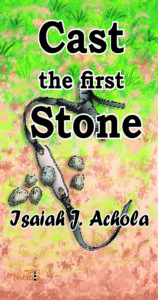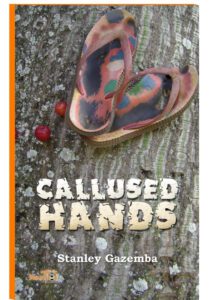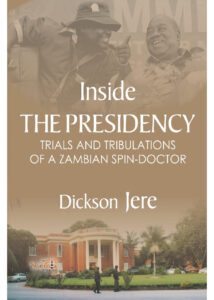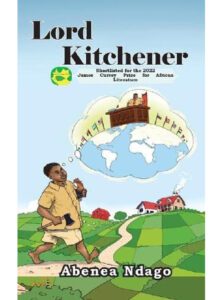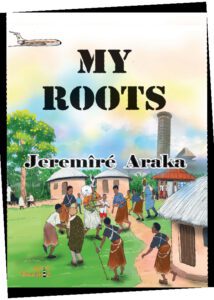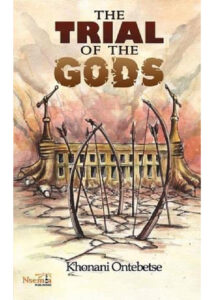
- Author: Jeremîré Araka
- Publisher: Nsemia Inc. Publishers, Ontario, Canada
- Reviewed on: August 9, 2023
BOOK REVIEW
Available from online stores such as amazon.com and nuriakenya.com or via [email protected]
My Roots navigates the complex and dynamic landscape of storytelling in contemporary Africa by employing an indefatigable prowess. The author demonstrates originality of thought by weaving a great tale set in two distinct regions of the world – the Middle and the West.
Drawing on his voyages to all five continents and extensive travels to 49 of the 54 African countries over nearly five decades, Professor Jeremîré Araka imbues an in-depth and insightful understanding of how cultures take on different meanings in different regional contexts.
Some incidences and events in the postcolonial and pre-colonial periods give the material a touch of verisimilitude through the use of real places, real people and real institutions which makes the story half-real and easy to believe. The physical locations mentioned in Kenya, Malawi, and the United States and references to Uganda, Tanzania, Nigeria, South Africa and Britain, colonial historical facts–though depressingly scary–and other real-life situations also introduce the reader to the evolution of modern Kenya. This is because a story is meant to take us into their world–to feel real as we read them.
This principle of verisimilitude can also be seen in the great works of Mark Twain’s Adventures of Huckleberry Finn and Jonathan Swift’s Gullivers Travels. In fiction, verisimilitude serves a higher purpose of conveying emotional truths to a reader in a way that will entertain them, help them through difficult times, make them view the world differently, and if possible, change their lives.
Araka’s plot is exceptional in its treatment of postcolonial migration and identity politics. Through Otenyo Ongooro, the author not only shows the impact of migration on the psyche of the characters but the futility of the modernist dream on Africans. The most unique aspect of My Roots is in illustrating the futility, and consequently, the need to integrate aspects of the so-called “primitive cultures” for the true success of the Continent in the Middle (Africa).
The book snuggles in the league of migration novels such as Salih Tayeb’s–a one-time candidate for the Literature Nobel Prize – Season of Migration to the North – named the most important Arabic novel of the 20th Century by the Arab Literary Academy in 2001; the Pulitzer Prize winner Hisham Matar’s The Return: Fathers, Sons, and the Land in Between; and the Caine Prize winner for African writing Brian Chikwava’s Harare North.
Set largely in a rural African Gusii nation, Nairobi, Malawi and the USA towards the end of colonization and onset of independence in Africa, My Roots is a novel that demonstrates the limitations of modernist philosophy particularly the flipside of migration and culture. It proves that the modernist claim to the creation of high culture through formal education, science and technology is as imaginary as it is a contrived make-believe. The novelties of ‘modernity’ may only be adopted to the extent that some significant elements of African traditions are suitably integrated.
My Roots is a story of postcolonial migration and the characters’ struggle to negotiate their existence in the mosaic of cultures that assail Africa during colonialism. The plot is on colonial subsistence, postcolonial migration and identity politics in which Otenyo Ongooro is the principal character. He is the first son of Chief Ongooro Angwenyi –himself a descendant of a long chain of rulers–and traditionally expected to inherit his father’s post in Bogetutu princedom.
With the advent of colonialism, new values infiltrate the Gusii society enticing Chief Ongooro’s whole family to pursue the modernist dream through formal education. Otenyo and some of his sisters readily embrace the dream, particularly in the physical sciences and law as they strictly clasp to Christianity. Otenyo acquires an engineering Ph.D. from the world’s leading university – Massachusetts Institute of Technology in the USA – and marries Gwendolyn Holmes (Wendo) a terrific African-American medic. Three of his sisters Nyabooke (Bhoke) and Bosibori (Boss) pursue their father’s pet career – medicine – although Bhoke later switches to clinical psychology as Mokeiira (Mokey) excels in the legal profession.
Elites tend to adopt a new type of entitlement by looking forward in time: the ascriptive right of kinship, which is assumed to be a ‘natural right’ of belonging to a specific ethnic group. Thus, Otenyo is transitorily happy to forego his hereditary entitlement as chief of Gusii nation’s Bogetutu Empire and embrace senior roles in the newly independent Kenya government (Kebede 2003:14). The mid-life death of his American-born wife is a bereavement that easily drives him psychotic, anxious and moods disorderly. This and the apparent failure of his children are complicated due to the misinterpretation of the cultural expressions of grief that may not apply to people of different cultural backgrounds (Eisenbruch, 1990).
The cultural mix that comes with it alienates the main characters in My Roots such that, despite their advanced knowledge of science and technology and ostentatious marriages, the narrator’s family exhibits spiritual emptiness and apparent societal failure. Mysterious accidents and serious illnesses inflict them and their close relatives. The loss of one’s social structure and culture can cause a grief reaction, as has been described by (Eisenbruch, 1991).
Indeed Otenyo and his siblings have great academic letters but are dislocated from their African traditional religious, metaphysical, and transcendental roots. They confront unbelievably unavoidable accidents and incurable sicknesses, deaths and mediocrity. Their father, Chief Ongooro, remains more successful because of his connection to the motherland, cultures and traditions.
Despite the narrator’s faith in the modernist dream, the author suggests that it is a wild goose chase. Thus, ‘belonging and the politics of belonging’ take a firmer central theme in psychology and sociology, theories that encompass both classical and contemporary perspectives (Yuval-Davis 2006: 198).
This episode parallels Tayeb’s Season of Migration whose narrator’s father had died when he was an infant. Raised by his mother he distinguished himself as a child prodigy and was sent on scholarships to study abroad. After seven years of pursuing graduate studies in England, the narrator returns to Wad Hamid, a small village on the banks of the River Nile in northern Sudan where he grew up. In London, he had commenced a series of relationships with English women, three of whom eventually committed suicide.
The narrator of Season of Migration is happy to be home in Sudan. While upon his return he felt rooted and connected to his country and his people, his encounter with a certain Sa’eed leads him to experience a deep sense of alienation. Suddenly, he wonders whether, like Sa’eed, he is also not cut off from those around him as a result of his long migration abroad. Nonetheless, the narrator continues with his life, taking up a job in the capital city Khartoum, and returning to the village only occasionally, unconnectedly.
In Brian Chikwava’s Harare North, the narrator begins his account with his arrival at Gatwick airport where, after mentioning “the magic word–asylum”, he is immediately detained. Though eventually allowed to formerly enter England, the narrator is not, in fact, an ideal asylum seeker. He’s planning to head back to Zimbabwe as soon as possible.
Accumulating money is not all that difficult for him (nor is spending it, and like most of the others, the narrator is willing to pitch in where necessary, whether sending money back to Zimbabwe to demanding relatives or when one of them is in trouble in London). But there’s little actual joy living abroad, disjointed from his birth relatives.
In Hisham Matars’, following the overthrow of Qaddafi, the novelist journeys to his native Libya after an absence of thirty years. When he was twelve, Jaballah Matar and his family went into political exile. Eight years later Matar’s father, a former diplomat and military man turned-brave-political dissident, is kidnapped from the streets of Cairo by agents of the Libyan government. He is believed to have been held in the regime’s most notorious prison. But now, the prisons are empty and little hope remains that his father Jaballah will be found alive. Yet, as the author writes, hope is “persistent and cunning.”
However, Matar warns immigrants never to abandon their homeland (roots). He writes, “[n]ever leave your homeland. Leave and your connections (roots) to the source will be severed (uprooted). You will be like a dead trunk, hard and hollow.”
As Prof. Araka winds the plot to the close, the haplessly rootless Otenyo Ongooro, already past his prime, saunters back to his long-forgotten Gusii motherland in search of a lost identity (roots). But his desire to reconnect with Keruboo his jilted childhood flame backfires miserably. He is unaware that he had left her pregnant with daughter Nyaitondi now married to a 12-year-old granddaughter Magoma. The encounter ends up catastrophic as Keruboo stubbornly and adamantly rejects his advances with a sleight of hand as ‘you’d swat a disgusting odour across your nose’.
To quote an excerpt:
Keruboo: “Ngokumi’ore! (You ain’t seen nothing.) You’re an expert at sorry and keeping the borderlines bleary. It’ll be all right if you just let go. The pints of pepper-hot tear drops you let me shed have not sufficiently dried up. And I doubt they ever will. Besides, I dread to engage in wetting a surviving husband’s eye, you the widower,” she snaps.
Otenyo: “Ngokumi’ande?” (Won’t I be stunned?).
I hum in a near-whisper not realizing that what she means is ‘How I wish you are trampled by a giant Caterpillar bulldozer, you maggot-faced creep’.
Otenyo: “May I drop you home?”
Keruboo: “Regrettably no! Take all my loves, Otenyo. Hate me if you may. Even now. Termination. End of story. Full stop!”
This reiterates Albert Camus’s (2014) description of the fate of immigrant characters as “a lost people”. He states “. . . [c]ut off from his religious, metaphysical, transcendental roots, man is lost; all his actions become senseless, absurd and useless. Africa as biology and Africa as a continent is founded on the metaphysics of difference, a quest for civilizational and cultural ontology (Zeleza, 2006: 15).
Finally, Jeremîré has successfully endeavoured to present My Roots in long and short paragraphs, crisp sentences, and relatively liberal illustrations of maps. He has written a text that is extremely easy to read and therefore amenable to both the young and old. The language used is easy to follow and to understand.
My Roots successfully blends the theoretical with the practical. The periodic use of Gusii language, scary folktales and wives-tales as well as sporadic sprinkles of contemporary Rhumba music of the period, and their instant interpretations, appeal and imaginatively describe the motivations of the characters. It is for this stylistic reason, as well as for the interesting, relevant content, that the book is recommended for anyone with an interest in postcolonial migration, identity politics, ‘belonging’ and ‘the politics of belonging’. Most content is contemporary or historical rendering the 340-page volume effortlessly suitable, readable and readily understood by the 15 year-olds and above.
My Roots can be purchased from online stores such as amazon.com.
Dr. Kaijanangoma, Dietrick K. Ph.D., for African Journals Online (University of Dar es Salaam Library Journal. Dr. Kaijanangoma is a senior communication scholar at St. Augustine University of Tanzania, Mwanza.

